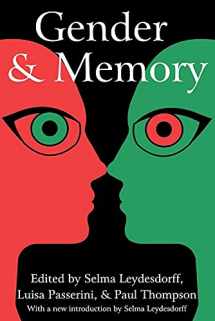
Gender and Memory: Memory and Narrative Series
ISBN-13:
9781412804639
ISBN-10:
1412804639
Author:
Luisa Passerini
Publication date:
2005
Publisher:
Routledge
Format:
Paperback
212 pages
FREE US shipping
Book details
ISBN-13:
9781412804639
ISBN-10:
1412804639
Author:
Luisa Passerini
Publication date:
2005
Publisher:
Routledge
Format:
Paperback
212 pages
Summary
Gender and Memory: Memory and Narrative Series (ISBN-13: 9781412804639 and ISBN-10: 1412804639), written by authors
Luisa Passerini, was published by Routledge in 2005.
With an overall rating of 3.6 stars, it's a notable title among other
books. You can easily purchase or rent Gender and Memory: Memory and Narrative Series (Paperback) from BooksRun,
along with many other new and used
books
and textbooks.
And, if you're looking to sell your copy, our current buyback offer is $0.89.
Description
Gender and Memory brings together contributions from around the world and from a range of disciplines--history and sociology, socio-linguistics and family therapy, literature--to create a volume that confronts all those concerned with autobiographical testimony and narrative, both spoken and written. The fundamental theme is the shaping of memory by gender. This paperback edition includes a new introduction by Selma Leydesdorff, coeditor of the Memory and Narrative series of which this volume is a part. Are the different ways in which men and women are recalled in public and private memory and the differences in men's and women's own memories of similar experiences, simply reflections of unequal lives in gendered societies, or are they more deeply rooted? The sharply differentiated life experiences of men and women in most human societies, the widespread tendencies for men to dominate in the public sphere and for women's lives to focus on family and household, suggest that these experiences may be reflected in different qualities of memory. The contributors maintain that memories are gendered, and that the gendering of memory makes a strong impact on the shaping of social spaces and expressive forms as the horizons of memory move from one generation to the next. They argue that in order to understand how memory becomes gendered, we need to travel through the realms of gendered experience and gendered language.


We would LOVE it if you could help us and other readers by reviewing the book
Book review

Congratulations! We have received your book review.
{user}
{createdAt}
by {truncated_author}


